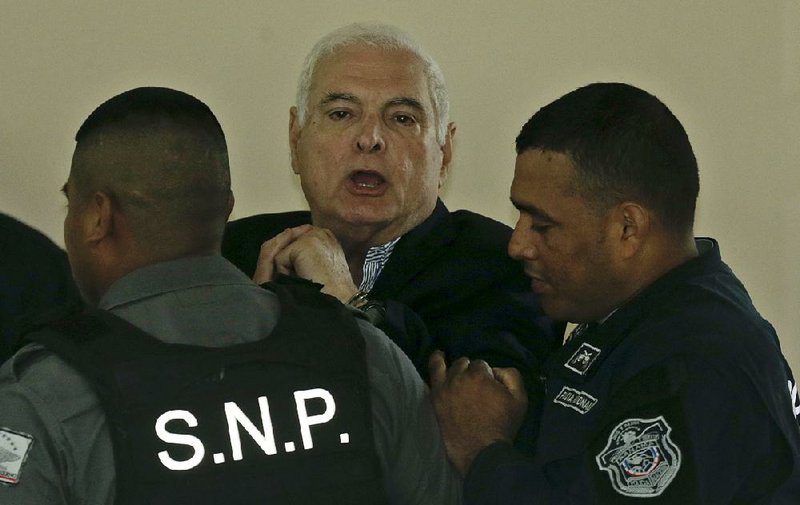A Panamanian tribunal’s decision Friday to clear former President Ricardo Martinelli of criminal charges seemingly ends a lengthy effort to prosecute the University of Arkansas, Fayetteville graduate and benefactor.
A three-judge panel found Martinelli innocent of charges tied to alleged political espionage while he held office from 2009 to 2014, The Associated Press reported. The charges included improperly purchasing espionage equipment with public funds. Prosecutors had sought a 21-year prison sentence.
Instead, video of Martinelli on Saturday showed him at a shopping mall surrounded by what appeared to be a swarm of well-wishers. Martinelli, 67, had maintained his innocence and said he was the victim of a political conspiracy.
Not all cheered the result, however.
In a statement Sunday, the Panamanian chapter of the advocacy group Transparency International linked the outcome of the Martinelli case to other corruption investigations in Panama that have failed to result in penalties for those accused of wrongdoing. The group stated there is “an institutional crisis” in the country’s justice system.
Before Martinelli’s 2017 arrest, the AP reported that he left Panama as a corruption investigation opened.
U.S. authorities arrested Martinelli outside his Florida home in June 2017 and held him in a federal detention facility while Martinelli fought a legal battle to avoid extradition. In June 2018, he was extradited to Panama.
Reuters news service reported that Martinelli had been granted home detention beginning in June of this year after previously being held in a Panamanian jail.
The court’s ruling Friday stated that the “accusation is based on vague and ill-structured facts,” the AP reported, with the court also stating that prosecutors failed to tie Martinelli to the acquisition or ownership of the spying equipment.
Mark Rushing, a UA spokesman, said the university had no comment about the panel’s decision Friday.
UA has longstanding ties to Panama, a country of roughly 4 million people in Central America, that date back to agricultural collaborations in the 1950s.
It was during Martinelli’s time as president, however, that the university began seeing tremendous growth in the number of international students arriving from Panama.
In fall 2010, UA enrolled three Panamanian students. Last fall, the university enrolled 145 students from Panama. More international students came to UA from Panama than from any other country, including China, which has far more students attending U.S. colleges and universities. UA enrolled 141 Chinese students last fall.
A Panamanian government program — the National Secretariat for Science, Technology and Innovation — sends students to UA and provides a full scholarship. The ninth class of those students, who receive intensive English training before starting their academic work, arrived in Fayetteville this year.
“Maybe we were better known as an institution because of Martinelli, but I don’t think that’s the reason that they accepted this proposal,” said Lynn Mosesso, UA director of graduate and international recruitment and admissions, noting also that the pipeline of students has continued despite political changes in Panama.
Martinelli earned a bachelor’s degree from UA in business administration in 1973. He became wealthy as a supermarket magnate. While president of Panama, Martinelli returned to Fayetteville for campus visits, and he received an honorary Doctor of Humane Letters degree from the university in 2013.
Martinelli was named to a group of approximately 150 volunteer leaders for UA’s Campaign Arkansas fundraising effort.
Despite Martinelli’s legal troubles, the university kept Martinelli listed among its volunteer fundraising leaders.
Gifts from Martinelli to UA totaled $200,000 based on documents released by the university in 2017 under the state’s public disclosure law.
In Panama, Martinelli’s time in office coincided with an admitted bribery effort by the firm Odebrecht, as noted by the U.S. State Department. Odebrecht, based in Brazil, in 2016 admitted to paying $59 million in bribes to win Panamanian contracts, according to the State Department’s 2019 Investment Climate Statement for Panama, which also notes that “the scandal’s reach has yet to be fully determined.”
But while questions remain, it’s unclear if the country’s leadership — a new president, Laurentino Cortizo, took office this year — will seek further criminal prosecution of Martinelli.
“My sense is that this new government that took over on July 1 is not likely to pursue — at least not pursue it strongly — those additional charges,” said Orlando Perez, a Panama politics expert and dean of the University of North Texas at Dallas School of Liberal Arts and Sciences.
The political party associated with Martinelli showed strength at the polls, Perez said.
Perez said deputies in this party, Democratic Change, “are loyal to Martinelli,” so “in the end I think the new president is going to proceed in the way that facilitates his ability to govern and get his legislation passed,” Perez said.

